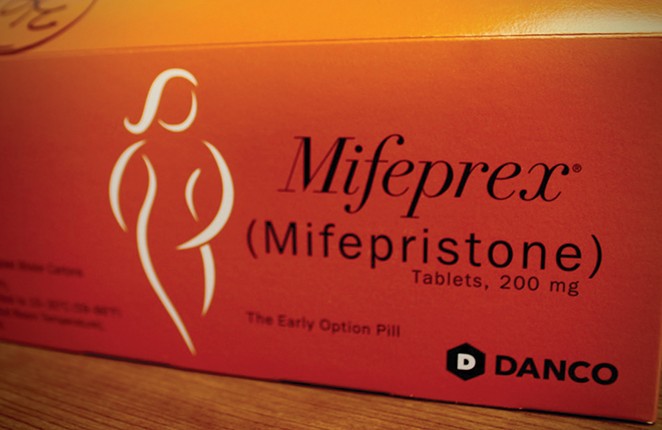Last June the United States Supreme Court overturned Roe v. Wade, ending 50 years of federal precedent protecting access to abortion. Thirteen states had trigger laws that immediately criminalized the procedure, and others have created more strict limits on when someone can get a procedure. Now, a federal court in Texas is set to rule on a case that could ban mifepristone, one of two drugs used to induce a medicated abortion.

Medicated abortion accounts for more than half of abortions in the United States and about 60% of those performed in Oregon, according to the Guttmacher Institute. Mifepristone is typically used in conjunction with misoprostol. Mifepristone ends a pregnancy by blocking hormones that support a pregnancy, and misoprostol softens the cervix, expelling a fetus.
The ruling could rescind the U.S. Food and Drug Administration's 23-year-old approval of the drug. Alliance Defending Freedom, a conservative group that supported the Mississippi case that overturned Roe v. Wade, filed the suit in November, claiming the FDA didn't have the authority to approve the drug, that it was understudied and unsafe.
"The FDA failed America's women and girls when it chose politics over science and approved chemical abortion drugs for use in the United States. And it has continued to fail them by repeatedly removing even the most basic precautionary requirements associated with their use," the lawsuit states.
A study from the Food and Drug Administration found adverse events in 0.2% of uses, and that those were typical non-emergencies. That's a lower rate than many over-the-counter drugs like Tylenol. Though 18 states have eliminated access to both medication and surgical abortions, this ruling could impact states that protect access to abortion.
The FDA approved the drug under an expedited process on the condition it allow the FDA to impose restrictions on its use. That process is one of the key sticking points of the lawsuit in Texas, but those restrictions are a basis for another lawsuit that argues the drug is overregulated. On Feb. 24 Oregon Attorney General Ellen Rosenblum joined a lawsuit with 11 other attorneys general against the FDA.
"In this time when reproductive health care is under attack, our coalition of 12 states seeks to ensure that access to Mifepristone – the predominant method of safe and effective abortion in the U.S. – is not unduly restricted. Our coalition stands by our belief that abortion is health care, and health care is a human right," Rosenblum said in a statement.
Mifepristone is one of only 60 drugs that are singled out for restrictions called Risk Evaluation and Mitigation Strategies, or REMS. Those restrictions require health care providers to be certified by the drug's distributors, and that patients sign an agreement that certifies they took the drug to end a pregnancy.
"The restrictions on mifepristone are a particularly burdensome type of REMS known as Elements to Assure Safe Use, which strictly limit who can prescribe and dispense the drug. FDA's decision to continue these burdensome restrictions in January 2023 on a drug that has been on the market for more than two decades with only "exceedingly rare" adverse events has no basis in science," the joint lawsuit states.
The American College of Obstetricians and Gynecologists lent support to the lawsuit, calling the FDA's REMS and Elements to Assure Safe Use outdated. The FDA has relaxed some restrictions on mifepristone recently, and now allow retail pharmacies to dispense prescriptions. Planned Parenthood also came out against the lawsuit.
"Mife has been approved by the FDA for more than 20 years, and has been used by more than 5 million people in the U.S. to safely end their early pregnancies. This lawsuit is not about the safety of a pill — it's a political attack on people's ability to control their own bodies and lives, and will affect people across the country," Planned Parenthood said in a statement.
Some legal scholars have questioned whether the Texas judge's ruling could actually ban the use of mifepristone. No court case has rescinded FDA approval of a drug, and the federally regulated procedures mandates public hearings and deliberations with the FDA. Still, many are preparing for a future without Mifepristone, including the executive branch.
"There are now partisan and political attacks attempting to question the legitimacy of a group of scientists and doctors who have studied the significance of this drug. There is now an attempt by politicians to remove it from the ability of doctors to prescribe and the ability of people to receive," said Vice President Kamala Harris in a statement.
If mifepristone is banned it wouldn't outright end abortion by medication. Misoprostol would still be available and can effectively end a pregnancy, though it's slightly less effective than the combination of drugs and had an increased likelihood of additional medical care.

























